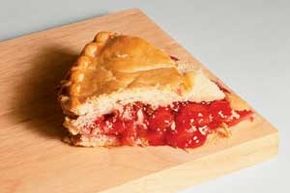Losing weight is hard to do alone. Joining a support group may help dieters with their weight-loss goals. In this article, we'll explore different weight-loss support group programs. We'll start with Tops, a support system for dieters trying to lose weight.
TOPS: The Premise
TOPS, which stands for Take Off Pounds Sensibly, is a no-frills, low-cost diet plan. Actually, it's not a diet at all but rather a loosely knit support system for people trying to lose weight. Founded in Milwaukee more than 50 years ago, the nonprofit organization has none of the traditional diet-plan offerings: There's no official diet, no prepackaged foods, no supplements, and no counseling. But for $24.00 a year plus local chapter dues of about $5 a month, members can attend weekly support meetings at one of about 10,000 local TOPS chapters worldwide (there are more than 200,000 members), where they will weigh themselves, discuss problems, and even exchange recipes.
Advertisement
Chapter leaders are volunteers from the TOPS membership. In addition to weekly support meetings, the national organization offers incentives for weight loss and even crowns a new weight-loss king and queen each year. Once you become a member, you'll receive a monthly magazine called TOPS News that offers contests, weight-loss incentive plans, self-help articles, and recipes. The magazine also chronicles TOPS success stories from around the world. TOPS members who reach their goal weight, which is supposed to be set with the help of a health care professional when you join, are eligible for membership in KOPS (Keep Off Pounds Sensibly). Little is different with the maintenance membership; KOPS members still attend meetings with TOPS members and have weigh-ins, etc. TOPS also offers motivational rallies, workshops, and retreats. Kids and teens are welcome in the program, too.
TOPS now has online help, too, at http://www.tops.org/. You can find most of the material from TOPS News and read TOPS success stories. As a TOPS member, you can also access chat rooms, e-cards, message boards, and other support materials.
The Rationale
For people who feel more comfortable figuring out their own path to weight loss, TOPS offers a loose system of support but little more. Exactly what kind of support you'll get from your local chapter is impossible to predict, since chapters vary quite a bit from one to another. In fact, the organization prides itself on the individuality of its chapters, which cater to the needs of the group. Weekly TOPS meetings always begin with a confidential weigh-in, which is followed by a program that sometimes includes presentations by health professionals who volunteer their time to speak. Through group support and some weight-loss competitions, TOPS provides incentives for weight loss. The competitions are set up so that you compete only within your own age category and weight class.
What's for Breakfast, Lunch, and Dinner?
Because there is no official diet plan or even preset calorie intakes, there are no typical meals. However, TOPS recommends that its members go to a health care professional for personalized diets and physical activity plans. In addition, the organization does offer an optional diet-planning book called The Choice Is Mine that contains simple guidelines for planning low-calorie diets of 1,200- 1,500- and 1,800-calories a day, based on USDA nutrition guidelines and the diabetic exchange list, and it offers a sample 28-day menu guide.
Fact or Fiction: What the Experts Say
Gains and Losses/What's the Damage?With no set TOPS diet and everyone pretty much on their own to plan their diets, it's hard to say how much you might lose or how quickly you can expect to lose it. Neither the TOPS organization nor the individual chapters make any claims about an expected rate of weight loss. The organization leaves this up to the discretion of each dieter and his or her physician. While this freedom may work well for some people, it carries some risks, too. It could lead some ill-informed dieters to unwittingly cut back too far on calories or to follow an unbalanced diet. Though physical activity is recommended, and some local chapters incorporate group walks into their weekly meetings, it could be emphasized more as an essential part of weight loss. The Choice Is Mine does offer step-by-step instructions for beginner, intermediate, and advanced exercise programs.In the next section we'll cover Overeaters Anonymous. This information is solely for informational purposes. IT IS NOT INTENDED TO PROVIDE MEDICAL ADVICE. Neither the Editors of Consumer Guide (R), Publications International, Ltd., the author nor publisher take responsibility for any possible consequences from any treatment, procedure, exercise, dietary modification, action or application of medication which results from reading or following the information contained in this information. The publication of this information does not constitute the practice of medicine, and this information does not replace the advice of your physician or other health care provider. Before undertaking any course of treatment, the reader must seek the advice of their physician or other health care provider.
Advertisement
